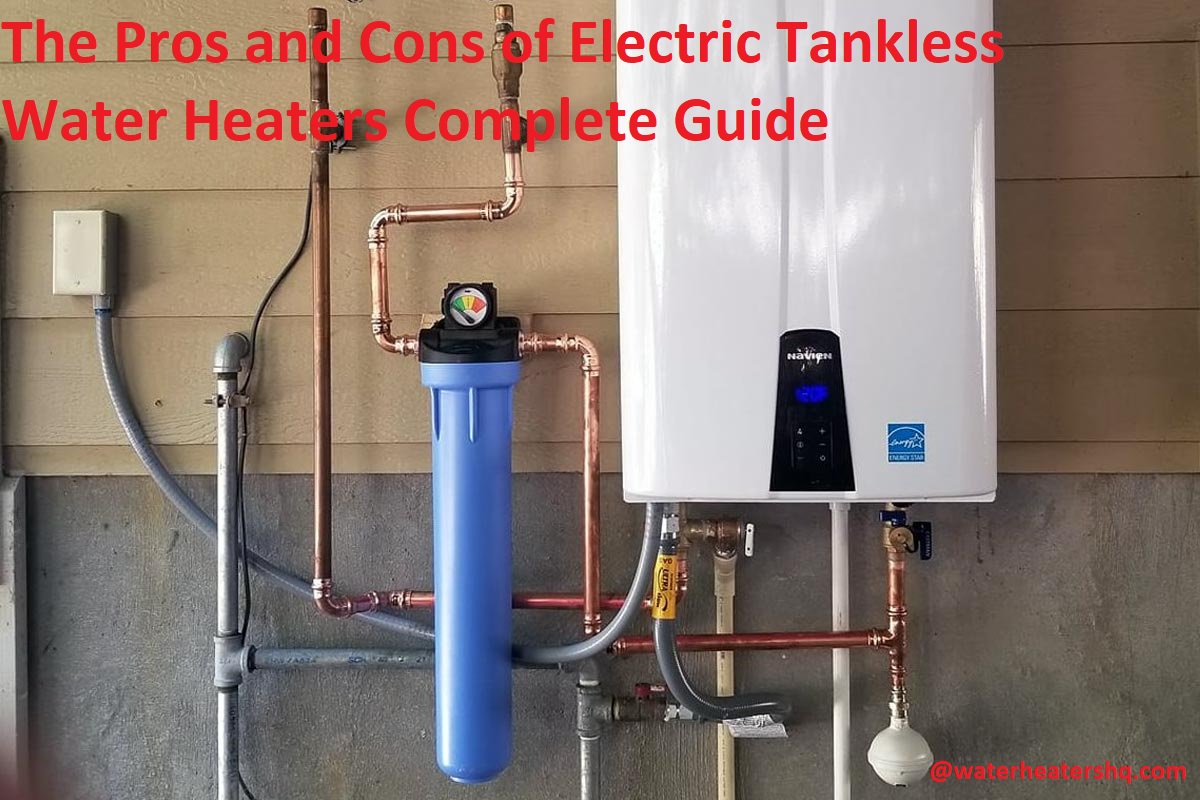Are you looking for a more reliable and energy-efficient way to heat your home’s water? Then you need to consider electric tankless water heaters.
With a tankless heater, you can get hot water on demand while also saving money on your energy bills. Read on to learn more about the pros and cons of this appliance, so you can make an informed decision.
Electric tankless water heaters offer numerous advantages and disadvantages over traditional storage water heaters. This guide explores the pros and cons of electric tankless water heaters to help you decide if they’re right for your home.
One of the biggest advantages of an electric tankless water heater is its heightened efficiency. Because there is no storage tank, it only heats the water when it’s needed, which saves energy costs over time. It also requires a smaller footprint than a traditional model so it can be installed in tight spaces like closets or inside cabinets. There are several additional benefits associated with electric tankless water heaters that make them a good option for certain applications depending on specifications.
There are some drawbacks as well as benefits to consider before investing in an electric tankless heater such as cost, cold-weather performance and maintenance requirements. The upfront cost associated with these models is typically more expensive compared to traditional storage tanks, which can be discouraging for some households. Additionally, they do not typically do well in colder climates due to decreased flow rates at lower temperatures, which can prevent adequate heating from occurring at times of lower demand. And finally, maintenance costs for these types of units may be higher due to their specialty components that require special cleaning and inspection periodically.
Explanation of electric tankless water heaters
Electric tankless water heaters, commonly referred to as point of use (POU) heaters, are energy efficient appliances that provide an on-demand source of hot water. Unlike traditional electric tanks, tankless units only turn on when you need hot water. As a result, these devices offer both direct and indirect cost savings when compared with storage water heaters.
Tankless designs utilize electric heating element technology that heats cold incoming water within the unit itself. This is done in real-time and with no standing storage supply required; only the amount of hot water necessary is heated at any given moment. Electric tankless models are compact and can be placed nearly anywhere in your home close to where hot water delivery is needed most. This avoids the need for bulky traditional storage tanks which take up valuable space and sometimes require costly reimplementation during remodels or upgrades.
Tankless designs boast efficient performance ratings that range between 99%-100% depending on the specific unit’s size and age; substantially more than most traditional electric tanks which usually have energy factors ranging from 60-80%. In addition, electric tankless models are much quicker to recover after heavy spikes in demand and can replenish stored hot waters reserves significantly faster than their counterparts.

Brief overview of the pros and cons of electric tankless water heaters
Electric tankless water heaters are a convenient home heating system that offers instant hot water on demand. This style of unit uses electricity to heat the incoming cold water instead of heating a large tank. As with any type of appliance, there are some pros and cons associated with electric tankless water heaters.
Pros: -Cost savings:Tankless units cost significantly less to operate than their traditional counterparts as they only use energy when necessary, whereby conventional storage tanks require a continual supply of energy to maintain temperatures even when not being used. -Space saving: Tankless units can be mounted almost anywhere, allowing them to save space in smaller homes and apartments where there isn’t a lot of room for bulky appliances. They can also be installed outdoors if desired – perfect for those who want an outdoor shower or sink without sacrificing valuable interior space! -Environmental impact: By eliminating the need for heated tanks of standing hot water, electric tankless systems reduce their environmental impact by using less energy than traditional systems. -Lower maintenance costs: Since electric tanklessness doesn’t need ongoing maintenance and repairs like standard models, they tend to cost less to maintain in the long run.
Cons: -Higher upfront costs: Electric tanks require a dedicated circuit and measure your home’s voltage – leading to higher initial installation costs which can put them out of reach for some people depending on their budget. -Less flexibility: Unlike gas models, electric ones don’t allow you to adjust the temperature setting – so you might find it more difficult to regulate how hot your tap water is on demand. -Location limitations: Due to their complex wiring system, electrical tankless systems must be installed very close to an outlet or breaker panel – which can limit where you can install them in your home or property depending on availability.
Pros of electric tankless water heaters
Electric tankless water heaters offer a variety of advantages to users, but there are also some potential drawbacks. To help you make the best decision for your needs, the pros and cons of electric tankless water heaters are outlined below.
Pros: -Electric tankless water heaters provide an endless supply of hot water. This means you’ll never run out! -Tankless water heaters take up less space compared to traditional tanks as they can be installed on a wall or in a small closet. -Unlike traditional tank-type water heaters, these units do not need to be constantly heated and refilled–resulting in substantial energy savings of up to 50%. -These systems can be installed indoors or outdoors, depending on your needs. Since they don’t require venting like some traditional tanks, this can save time and money during installation. -Most electric tankless water heaters come with adjustable temperature controls that allow for further energy savings. -Some models offer advanced safety features including anti-scald valve protection and freeze protection technology which prevents the unit from running while temperatures are too cold outside.
Energy efficiency
A tankless water heater is known for its energy efficiency, which helps reduce monthly electricity costs. Because these models heat the water only when it’s necessary to do so (for example, when you’re going to take a shower), they don’t need to maintain the temperature of the hot water all of the time. In other words, they use less power overall and may even qualify for rebates and incentives by your local government or electric company.
Tankless models also require less maintenance than traditional tank-style water heaters because there are no components that need to be periodically replaced. This means you won’t have to worry about unexpected repairs and service calls over time which can further save money on electric bills.
Cost savings
Electric tankless water heaters are an energy efficient option that can give you hot water on demand, instantly, and for as long as you need it. But like all other major purchases, there are pros and cons to consider before making such an investment. In terms of cost savings, electric tankless water heaters offer several immediate positives that should be evaluated before purchase and installation.
First off, electric tankless water heaters offer the possibility to reduce your energy costs over time as they require less energy to heat your water than standard hot water tanks do. This means more of the cost associated with running an electric tankless heating system is accounted for in its initial price tag rather than through differing utility bills each month. That said, individual utility rates and area differences should be taken into consideration when evaluating potential savings associated with electric tankless systems.
Moreover, one of the main benefits associated with installing an electric tankless system is its small size versus traditional electric hot water heating systems that use large tanks for storing heated water. This can save valuable space in a home or business setting since these units are typically smaller than their traditional counterparts — resulting in more space for other activities or uses. In addition, since there’s no need for a large storage or pre-heating area like there is with traditional systems, electric tankless systems can often be installed in locations where regular hot water tanks are simply not viable due to size constraints or difficult access.

Space-saving design
Electric tankless water heaters, also referred to as on-demand or instant electric water heaters, are a great space-saving option for any home when compared to traditional tanked electric water heaters. Electric tankless water heaters are designed with a much smaller footprint and they can be hung on the wall, avoiding bulky installations. This design will save considerable amount of space in cramped bathrooms and kitchens.
The compact size is usually the biggest advantage of the these types of water heaters. Tankless electric models can be mounted directly to the wall and most come with hardware to keep it securely in place. These units are usually much lighter in weight than gas models, making them an excellent choice for homes without strong floor support beams that could handle the weight of a larger tanked model.
Electric tankless models shouldn’t require very much maintenance as there is no large storage tank full of minerals or sediment which can corrode your system if not maintained properly or turn off on its own sporadically due to temperature swings like with gas powered models, allowing for reliability and longevity over time.
Cons of electric tankless water heaters
Electric tankless water heaters may have several advantages, but also have a few drawbacks to consider. Of these, the most common concern typically regards the cost of installation and upkeep.
Electric tankless water heaters require specialized wiring and electrical outlets that can increase their installation costs by as much as double when compared to gas-powered models. In addition, many electric models require more frequent servicing than those powered by gas, leading to higher maintenance costs.
Other potential drawbacks include the risk of electrical shock from worn or damaged wiring and components, longer wait times for hot water due to lower temperatures in some models and lack of de-scaling options that may lead to a shorter system lifespan. Overall, while electric tankless water heaters can be a viable system for certain consumer applications, it’s important to weigh the pros and cons before deciding on your ideal solution.
Upfront cost
Installing an electric tankless water heater may require costly adjustments to your home’s electrical system. It requires a higher amp dedicated circuit in most households, and an upgrade to other house wiring and possibly a larger breaker box.
If you choose to install an electric in-line on-demand heater, or recirculate system, the costs could be even higher due to the possibility of additional labor required for installation. Additionally, tankless water heaters can run between $500 and $1,500—twice as much as many conventional water heaters. The most expensive model may cost as much as $2,000 or even more.
Homeowners should factor this upfront cost into their budget plans before making any purchase decisions.
Limited hot water output
A significant drawback of electric tankless water heaters is their limited hot water output. When sizing a tankless water heater for your household, be sure to consider the maximum flow rate of the unit, as well as its temperature rise capabilities.
Temperature rise is the amount of temperature a unit can raise the incoming cold water supply going into it. In general, electric tankless water heaters are not capable of handling high hot water demands such as simultaneous use of showers and large appliances like washing machines and dishwashers.
For example, if you have 3 showers running at once in your home, an electric tankless unit will not be able to provide enough hot water for all three locations. On demand gas powered units are better suited for bigger homes that require larger amounts of hot water with simultaneous demand.
Additionally, power fluctuations during peak electricity use times can cause fluctuations in availability and temperature levels of hot water from an electric tankless unit, further limiting their output potential.
Electrical requirements
Electric tankless water heaters require a 240-volt electrical supply, usually on a dedicated circuit. As such, they are recommended to be installed by a licensed electrician. But this also means you will need to have the meter upgraded and possibly need permission from your power supplier before the installation of your electric tankless water heater.
Additionally, you may find that these units have an initial cost of about $800 (before any incentives), which is more than double that of traditional storage tanks. Furthermore, because these water heaters require quite a lot of electrical power to operate, running it for even an hour per day could add $25 or more to your monthly electric bill without the proper insulation and maintenance needed for optimal efficiency.
Factors to consider when choosing an electric tankless water heater
Choosing the right electric tankless water heater requires a bit of research and consideration. There are several factors to consider, including size, safety features, energy efficiency and more.
Size: Electric tankless water heaters come in a variety of sizes to meet different needs. Electric tankless water heaters are generally much smaller than traditional water heaters because they use wall-mounted designs and mounting hardware instead of tanks. If you’re planning on replacing an existing traditional tank-style water heater, it’s important to accurately measure your space before investing in an electric tankless model.
Safety Features: Electric tankless water heaters should be equipped with advanced safety technologies such as automatic shut-off valves and electronic safeguards that prevent overheating. Additionally, some models come equipped with features like adjustable temperature settings and rotatable nozzles for easy access to hot water from an outlet close by.
Energy Efficiency: It’s important to consider the energy efficiency rating when deciding on an electric tankless model. The higher the rating, the more efficient the heater will be, which means lower energy bills over time. Additionally, many electric tankless models utilize advanced technology to reduce standby losses by turning off when not in use — providing even greater cost savings for homeowners over time.
Installation: Installing an electric tankless water heater is generally easier than a traditional model due to its smaller size and wall mount design. However, it’s still important to make sure that your unit is properly installed according to local building codes and that all electrical connections are safely made before using it for hot water service. It’s also important to consult an experienced plumber or installer who can determine if your existing plumbing setup is compatible with a new electric tankless unit or if upgrades or modifications will need to be made first — this could vary depending on your system’s age or design specifics so check before making any major purchase decisions!
Household size and hot water usage
When determining whether an electric tankless water heater is the right option for your home, it is important to consider the size of your household and the typical hot water usage in that home. Generally speaking, families with two or more people and lots of hot water usage (such as laundry) will benefit from a tankless system. Single households with low-usage activities tend to be better off with a traditional tank system. To be sure you make the right choice for your needs, consult a qualified electrician who can help you analyze how much hot water your household consumes.
In addition to knowing the quantity of hot water you need at any given time, it is also important to think about when this usage is occurring. If multiple people in a household need hot showers in the morning and again at night – for example — then electric tankless installation may save money over time by eliminating standby losses associated with storing hot water. On the other hand, if everyone needs showers at different times throughout a given day, then an electric tank system would still be suitable and economical due to slower warm up time from on demand systems during “off-peak” hours (like while everyone’s sleeping).

Conclusion
When deciding which type of water heater to choose for your home, it’s important to weigh the pros and cons of both electric and tankless water heaters. Electric tankless water heaters require less initial investment than their tanked counterparts, while offering more cost savings over time. However, they have higher flow rates and shorter hot water run-times than most tank-style models. Electric storage heaters provide more consistent temperature regulation and longer hot water run-times but require a higher initial investment as well as regular maintenance.
Ultimately, the decision will come down to weighing the cost savings of each system against its features to determine what works best for your particular situation. Regardless of your choice, proper installation and maintenance are key ingredients to getting the most out of any system and reaping long-term energy savings.
FAQ’S
What is the downside of an electric tankless water heater?
The downside of an electric tankless water heater is that it may not be able to supply enough hot water for households with high hot water demands, and it may have a higher upfront cost compared to traditional tank water heaters.
Is an electric tankless water heater worth it?
Whether an electric tankless water heater is worth it depends on your specific needs and circumstances. It can provide energy savings and hot water on-demand, but may have a higher upfront cost.
Which is better tankless water heater or electric water heater?
A tankless water heater can provide energy savings and hot water on-demand, but may have a higher upfront cost compared to traditional electric water heaters.
Do tankless water heaters have a lot of problems?
Like any appliance, tankless water heaters can experience problems, but they are generally reliable when properly installed and maintained.
What are common problems with tankless water heaters?
Common problems with tankless water heaters include mineral buildup, ignition failures, and flow sensor issues.
What fails in a tankless water heater?
The most common parts that may fail in a tankless water heater include the heating element, control board, and temperature sensors.
Do tankless water heaters increase electric bill?
The energy savings provided by a tankless water heater can result in a lower electric bill compared to traditional tank water heaters, but the upfront cost may be higher.
What is the lifespan of an electric tankless water heater?
The lifespan of an electric tankless water heater can vary depending on usage and maintenance, but they typically last between 10-15 years.
What is the disadvantage of tankless?
The disadvantage of a tankless water heater is that it may have a higher upfront cost compared to traditional tank water heaters, and it may not be able to supply enough hot water for households with high hot water demands.
Where should tankless water heater not be installed?
Tankless water heaters should not be installed in areas with hard water or high mineral content without proper filtration, as mineral buildup can cause performance issues and damage to the unit.
See Also:
- Best 80 gallon electric water heater
- Best 110 volt tankless water heater for shower
- Best electric tankless water heater
- Best electric tankless water heater for rv
- Best electric tankless water heater for whole house


